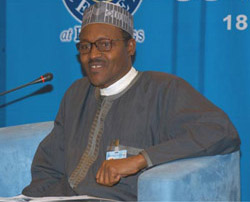
The United States has predicted victory for Muhammad Buhari of the All Nigeria Peoples Party (ANPP) ahead of the Nigeria’s Presidential elections slated for April 2007.
Buhari, according to the U.S Department of States poll conducted in late January from key Nigerian states is expected to lead the pack of presidential candidates jostling for the presidency of the oil rich West African country.
According to the poll conducted in Lagos, Enugu, Abuja and Rivers States, 37 percent named Buhari of the ANPP as the presidential candidate they would be voting for, 29 percent named Umaru Yar’ Adua of the Peoples Democratic Party (PDP) while 15 percent named Vice President Atiku Abubakar of the Action Congress (AC).
Support for each party according to the poll is split along regional lines as three quarters of those in Kano and a plurality in Abuja intend to vote for the ANPP. The South is a contest between the PDP and the AC. While the PDP leads in Enugu and Rivers, the AC is more popular in Lagos.
The poll conducted with 2500 Nigerian adult aged between 18-60 in the five states representing five Nigeria’s six region with only the North East left out noted that nearly four-in-ten predict that Buhari will win, while three-in-ten predict a Yar’Adua victory.
According to the Poll conducted by the office of Research in the Department of State through face-to-face interviews, Nigerians are less confident in Atiku’s success, perhaps due to the numerous obstacles his campaign is facing while Buhari enjoys an overwhelming support in the North.
Integrity, leadership, accountability, honesty and transparency according to the poll, are the qualities that have put Buhari ahead of all other candidates; qualities Nigerians are still skeptical about in other candidates.
While support for Buhari in the south is not too strong, the Department of State poll predicts that if Atiku is unable to get his name on the ballot, AC supporters who are mostly in the South could help Buhari who will need a 25 percent of votes cast to win.
However, the poll noted that the margin of error for the differences between regional and demographic subgroups is larger while the practical difficulties of conducting a survey of public opinion may introduce other sources of error into the results.
|